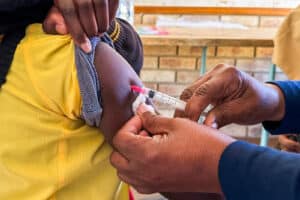With 1 102 confirmed cases, the NICD's latest report reveals a concerning rise in measles cases and recommends enhanced surveillance and increased vaccination efforts.

South Africa is still grappling with a severe measles outbreak, as revealed by a detailed report from the National Institute for Communicable Diseases (NICD).
The report – which is based on data compiled from laboratory testing up to 4 July – highlights an unsettling rise in measles cases nationwide.
NICD measles report
Since the 40th epidemiological week of 2022, the NICD assessed 6 490 serum samples, of which 1 110 (17%) were confirmed as measles.

The report’s findings present a reminder for medical personnel to remain vigilant for potential measles cases, especially in Limpopo and Gauteng.
Spike in two provinces
As of 8 July 2023, 10 new confirmed measles cases were reported across the country – five from Limpopo, four from Gauteng, and one from KwaZulu-Natal.
While the NICD notes a decrease in the percentage of positive test results from 31% to 12.5%, it said both Limpopo and Gauteng still present a concerning number of cases.
To date, 1 102 confirmed measles cases have been reported in eight provinces:
- Limpopo,
- Mpumalanga,
- North West,
- Gauteng,
- Free State,
- Western Cape,
- KwaZulu-Natal,
- Northern Cape.
READ: Measles outbreak: Most cases still recorded in Limpopo
Vital measures
The NICD called for enhanced surveillance to bolster and preempt future outbreaks more effectively.
In addition, it also emphasises the need to enhance national measles vaccination coverage which, according to the NICD, is insufficient in the at-risk population.
The NICD said it will continue to observe new cases among the unvaccinated and push for more comprehensive vaccine status documentation.
Malaria
Back in April, the NICD said the sub-Saharan African region accounts for 95% of the world’s malaria cases and it kills an African child every 60 seconds.
This led to the World Health Organization (WHO) approving the use of the RTS,S malaria vaccine in 2021, despite its modest efficacy of less than 40%.
That said, a newer version of the RTS,S vaccine (R21/Matrix-M) produced by Oxford University’s Jenner Institute showed higher efficacy during the trial phases.
This prompted Ghana and Nigeria to approve its use of the RTS,S vaccine in April 2023 without pre-approval from the WHO.
Support Local Journalism
Add The Citizen as a Preferred Source on Google and follow us on Google News to see more of our trusted reporting in Google News and Top Stories.






